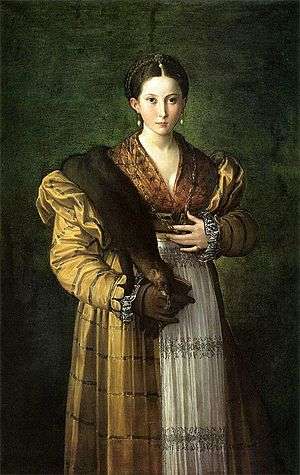Antea (Parmigianino)
 | |
| Artist | Parmigianino |
|---|---|
| Year | 1524–1527 |
| Medium | Oil on canvas |
| Dimensions | 136 cm × 86 cm (54 in × 34 in) |
| Location | National Museum of Capodimonte, Naples |
Antea (also known as Portrait of a Young Woman) is a painting by the Italian Mannerist artist Parmigianino, executed around 1524-1527.
History
The work is mentioned in 1671 as part of the Farnese collections in the Palazzo del Giardino, and in the late 17th century it was moved to the Ducal Gallery in the Palazzo della Pilotta in Parma. It is in Naples since 1734, apart a short period in 1816-1817 at Palermo. During World War II it was moved to Montecassino, where it was stolen by the occupying German forces and brought to Berlin, and then to the Austrian salt mines of Altaussee, from where it returned to Italy in 1945
In the description of the Farnese Ducal Gallery (1725) it is listed as Portrait of Antea or the Beloved of Parmigianino, referring to some famous courtesan of Rome and mentioned by both Benvenuto Cellini and Pietro Aretino. This attribution has been later contested, as well as the traditional dating of the work to the period in which Parmigianino was in Rome (1524–1527). Studies of the woman's garments, a mix of luxury and popular elements, led to the hypothesis that she could be either a daughter, a lover or a servant of Parmigianino, if not Pellegrina Rossi di San Secondo or another unknown noblewoman of Parma.
As was common practice among artists during this period, Parmigianino later returned to the piece to borrow elements for re-use in later works. In particular, the face of Antea re-appears in exacting detail as one of the angels accompanying the central figure group in the unfinished Madonna of the Long Neck.
See also
Sources
- de Castris, Pierluigi Leone (2003). Parmigianino e il manierismo europeo. Cinisello Balsamo: Silvana editoriale. pp. 236–237. ISBN 88-8215-481-5.
External links
- Page at the museum's website (Italian)